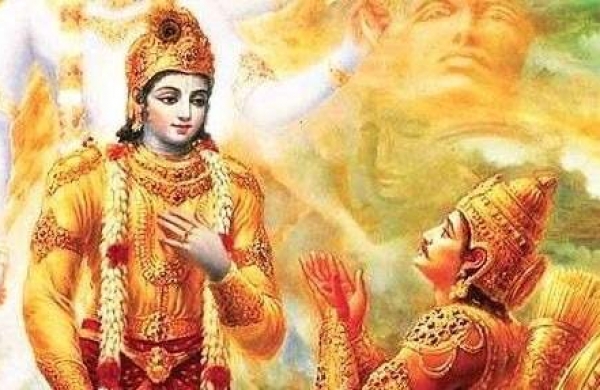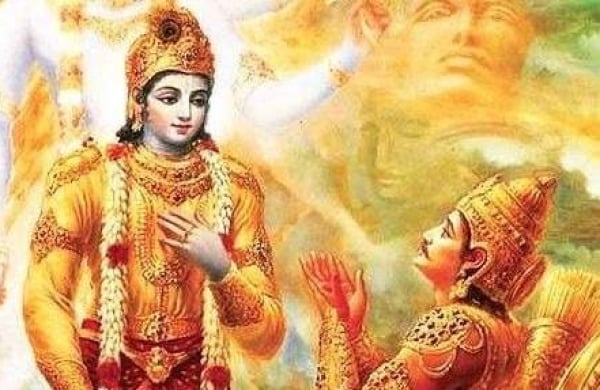The Practicality of Bhagavan’s Teachings for Our World
 There is great practicality in the teachings of Bhagavad Gīta, since they are based on reasoning.
There is great practicality in the teachings of Bhagavad Gīta, since they are based on reasoning.
The Practicality of Bhagavān’s Teachings for Our World
“Sectarianism, bigotry and its horrible descendant, fanaticism, have long possessed this beautiful earth. They have filled the earth with violence, drenched it often and often with human blood, destroyed civilization, and sent whole nations to despair.”[1] These words from Swāmi Vivekananda’s speech at the World Parliament of Religions in 1893 lamented the damage to human society and evolution wrought by these varied forms of intolerance. Regrettably, his hope that fanaticism in all its forms would henceforth die has proved to be inaccurate. Faced with these forces in our daily lives, what are we to do?
In the context of increasing intolerance and a global pandemic, it is easy to become angry, sad, depressed, and anxious as we contemplate these events, but daily sādhana supports our ability to engage in śravanam, mananam, and nididhyāsana on the nature of sorrow as taught by Lord Kriśṇa. In today’s world, this is extremely relevant. Bhagavān’s very practical solution involves helping us appreciate why sorrow, or śocya, is unjustified under any circumstances. I believe that bigotry and fanaticism are crude attempts to find a genuine sense of self and security in an ever shifting and uncertain world. Therefore, Bhagavān’s teachings regarding the nature of the self and the inappropriateness of sorrow offer hope to humankind with a vision of unity and security that is inherent in us already. And, no extraordinary beliefs are required. Just the ability to employ our minds.
All human beings seek for an escape from the pain of seeing ourselves as a body/mind conglomeration. The problem with the path of seeking is the expectation of some future release that does not exist right now. It implies a joyous experience is not available to me now and that I have to obtain it at some future point. This is a trap. Since the Gīta is the milk of the Upaniśads, Bhagavān’s teachings to Arjuna are not just convincing but transformative for a person who is qualified enough to understand them.
Bhagavān teaches us the true nature of the self is unchanging, self-effulgent consciousness in all states of experience independent of location or time. Consequently the justification for grief is removed. For the qualified student, realizing that anantam, limitless fullness, is the svarūpa of ‘I’, is only a question of knowledge, not seeking. Recognizing this, even as a basic starting point, is very liberating as a sense of relief washes over and we can rest more assuredly in the completeness of the self.
In this awareness, there is no justification for śocya. Where is sadness and grief when we know our self as non-different from Brahman, non-different from Iśvara? Bhagavān also impresses upon Arjuna that even if we do experience ourselves as different from Iśvara, śocya is unjustified from the perspective of the jagat because it is the very nature of jagat to change. Being dependent on sat for its very being, the entire jagat is mithyā or asat, having only a relative existence. Its nature is constant change. We can verify this using our own senses. Absolutely everything in the world changes, sometimes at rates so slow we can’t detect the change, but it is happening at an atomic level. Given this realization, what is the justification for sorrow when the world indeed changes? That is its nature so there is no need for sorrow. Additionally, Bhagavān teaches Arjuna that the svarūpa of Ātman is akarta. We are merely actors playing roles. If we confuse ourselves with these many roles, grief results because we think ‘I’ is doing things. If we can be clear ‘I’ is akarta, again there is no justification for grief.
There is great practicality in these teachings since they are based on reasoning. We do need śraddha in śruti that Brahman is satyam, jñānam, anantam, but if we are prepared via karma yoga and have a purified antahkarana, Vedānta śastra as pramāṇa will just ‘work’, just as the eyes work when I open them, validating that initial śraddha.
[1] “Swami Vivekananda's Speeches at the World 's Parliament of Religions, Chicago, 1893.” Belur Math Ramakrishna Math and Ramakrishna Mission, September 11, 2020. https://belurmath.org/swami-vivekananda-speeches-at-the-parliament-of-religions-chicago-1893/.



